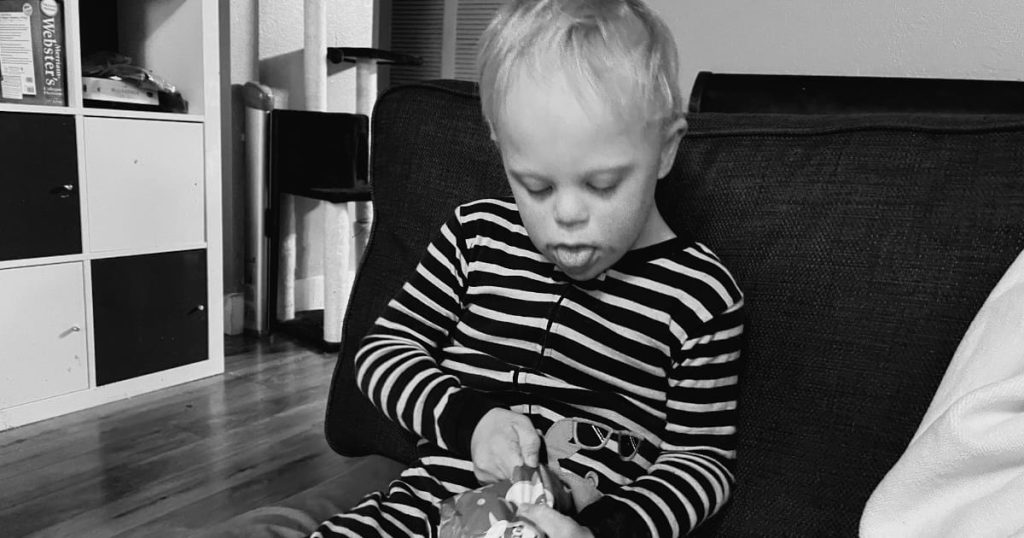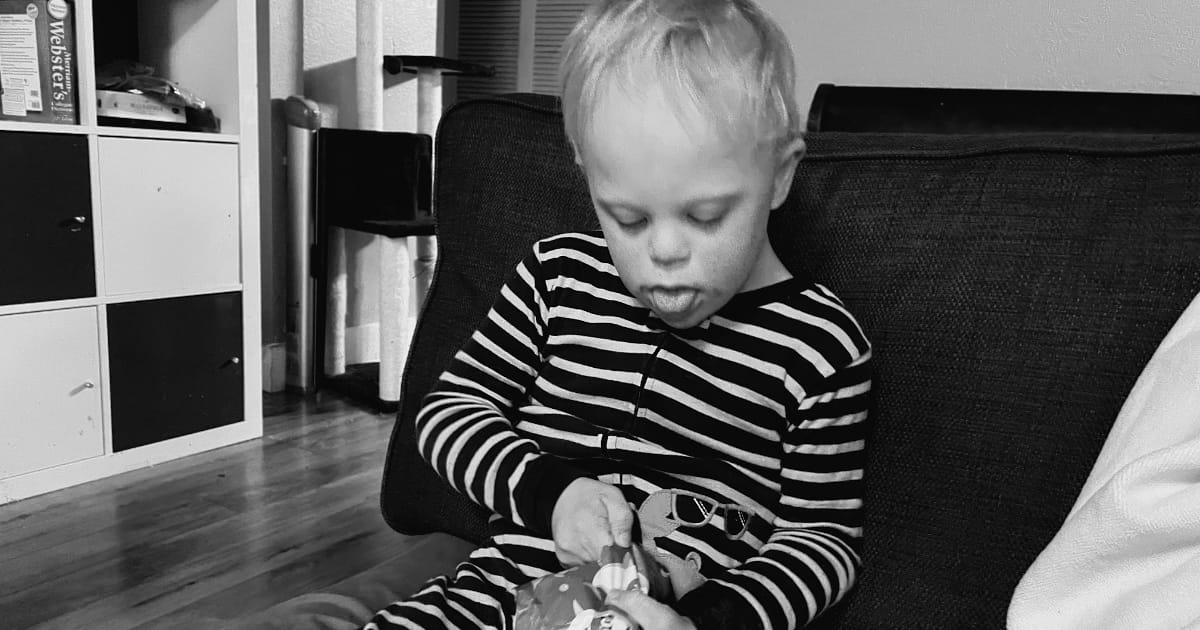Every milestone Percy reaches causes reflection on how far he’s come.
We tend to envision paths for our children. We wonder what sports they’ll play. We try to guess which school activities they’ll be involved with. We come up with a selection of their possible favorite books. We can’t help it. Their future seems unlimited. We’re excited about the possibilities before they get there.
It works differently when your child has special needs. Hopes and dreams begin more practically. Can our son get to a 95% oxygen level? Can he eat food with a spoon instead of through a gastrointestinal formula bag? Can he get to over ten pounds in weight? These were the possibilities we saw for Percy. He had a rough few years at the start.

Now, Percy is six years old. It’s a joyful thought. Despite what my eyes tell me, I still live in a reality where Percy is happy but sickly, a health project for doctors, almost needing to go to the hospital again. Percy was in this state for about four years. He’s enjoyed two healthy years since. I wonder when I’ll picture him as he is now, a sprightly little dynamo.
Percy has learned to open a birthday present with fearsome efficiency. It’s a recent milestone. Even on his fifth birthday, he took the wrapped box from us, held it for a moment, and handed it back, unsure of its relevance. Now he finds the seam in the wrapping paper. His finger tears away the paper hugging the box.
His birthday is in early December. Opening presents became a practice for the upcoming holiday. On Christmas Day, we found Percy opening many gifts for other family members. Percy showed the addictive satisfaction that people find when popping bubble wrap. I let him open all of my gifts. His determination to help was the best part of gift-giving.
Percy and I have been through a lot together. When I learned that Percy had Down syndrome before he was born, I knew his care would fall to me. I was already watching our oldest son Julian. My wife Iris had convinced me to move to a small town so she could take a job. The job was the sole reason we lived in the town. She couldn’t quit and take over watching Percy while I worked. There was no suitable work for me in the town. So I became Percy’s 24/7 caregiver.
Percy’s first years would lack the normalcy of other babies. It’s a consequence of health issues. Many parents of special needs children are understandably frustrated by this. Why should their child spend nights in the hospital when other children are having their first sleepovers at their grandparents’ house? I would’ve felt similarly had there been time to consider what we were missing. Percy was sick enough that we were kept busy by his care.
He had a mix of problems that weren’t critical but were of major concern. Percy was born with a hole in his heart. It affected his oxygen level, and so he needed assistance from an oxygen tank. I had to swap out the tank before it ended, which could be in the middle of the night. We had two spare tanks to use. The empty tank could be recharged, a process that took about four hours. To keep the oxygen cannula in Percy’s nose all day and night, we used a clear medical tape that adhered to his skin without causing too much irritation.
Pictures of those days show Percy with his cheeks taped up and the cannula in his nose.
It was important that we gave Percy enough oxygen but not too much. To monitor his oxygen levels, we used a pulse oximeter. A probe was attached to one of his toes. The pulse-ox would emit an alarm when Percy’s oxygen fell below a certain number we could set. We had set it for 85 percent. It was a low enough number that if he wiggled and the pulse-ox lost connection, the alarm wouldn’t constantly sound.
The doctors wanted Percy to be in the 92-95 range for oxygen saturation. Without the help of a tank, Percy was in the 80-85 range. It was a number that could cause a brain injury long term. We needed to keep Percy on oxygen all of the time. We took the tank with us when we left the house. The pulse-ox came along, too.
There was a plan to operate on Percy’s heart. Open heart surgery for small children was a routine operation. And yet, Percy had another problem in the way of scheduling the surgery. He was throwing for some unknown reason. It turned out to be a milk allergy. By the time we learned this, Percy had thrown up into his lungs quite a bit. The term is aspiration. In the process, he developed lung damage which caused hypertension.
Percy wasn’t deemed ready for the rigors of surgery. We needed to get his hypertension reduced first. The lungs naturally repair themselves, but his specialist was worried about the amount of damage sustained. They put Percy on medication to air out his lungs.
During the time when Percy was throwing up breast milk, the doctors cut him off from oral feeding. They put a gastrointestinal tube into his belly, a G-tube. We could feed him directly into his stomach. It would bypass any chance of the formula going into his damaged lungs.
The G-tube feeds added a third tether to Percy. We were given a small machine that regulated drip feeds through Percys’ port. Prior to the G-tube, Percy had been fed through a tube in his nose. The tube went down into his stomach. A G-tube was quite an upgrade from that.
All told, we had three devices to maintain and carry around with Percy. There was the oxygen tube taped against his nose. There was a pulse-ox machine with a probe attached to his toe. And there was a “Kangaroo Joey” machine that fed him over the course of 24 hours. It was a lot of gear. Percy and I would frequently drive from our small town up to the major hospital where he was born. At a roadside stop, I would bring in Percy’s car seat and the equipment. People at the Dairy Queen would often stare at us, then smile.
What does this have to do with Percy turning six? Fortunately, absolutely nothing. It’s a testament to Percy’s stamina, the expertise of his doctors, and the will of God that Percy is now free from all machines, tubes, and wires. He runs around as free as can be.
Percy underwent heart surgery at age four. The change in his energy level and overall health was dramatic. Percy was able to stop using the oxygen machine within weeks. The pulse-ox registered a solid 95 percent oxygen saturation unaided. He was allowed to eat by mouth, which removed the need for drip feeding. Percy still has the G-tube for times when he doesn’t eat enough. We’re waiting for a time when it can be removed for good.
Percy has no memory of those days. I’m trying to forget them. With the passage of a few more birthdays where Percy destroys wrapping paper, devours cupcakes, and dances around unencumbered, I’m sure I’ll get there.





